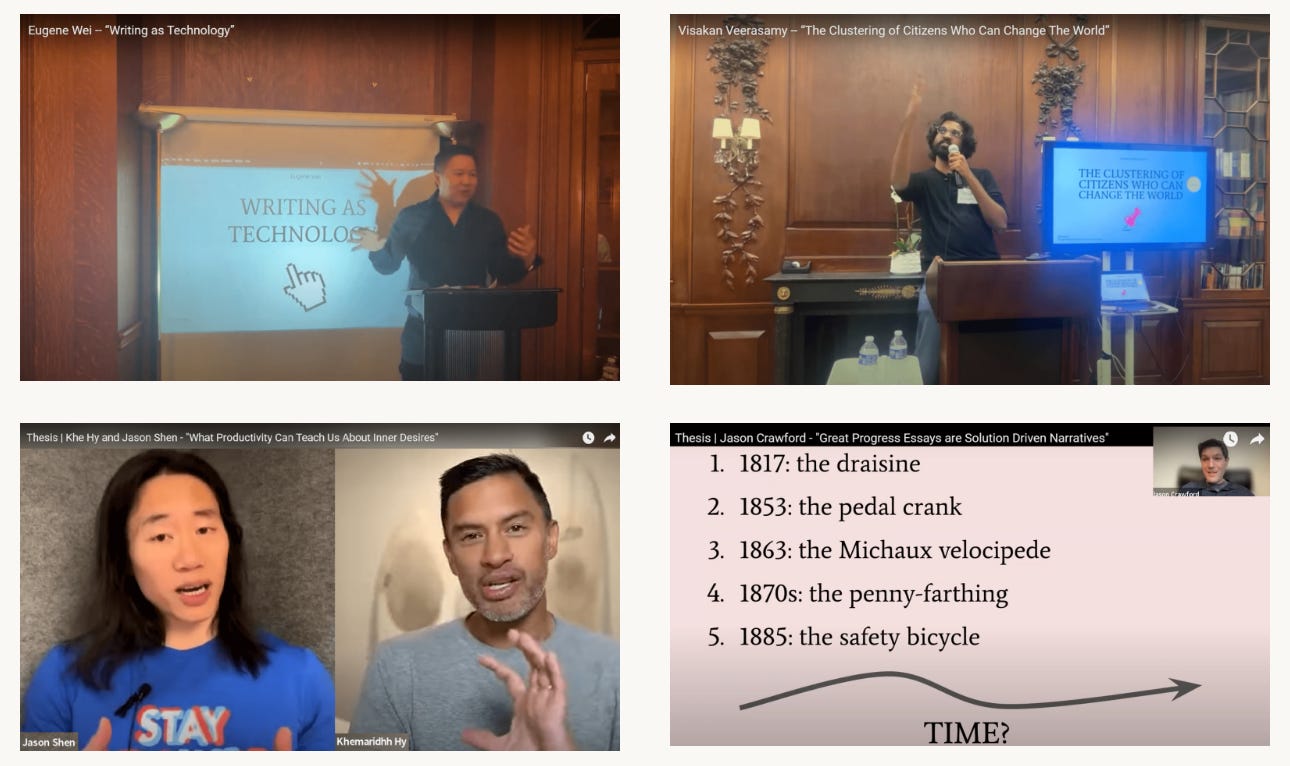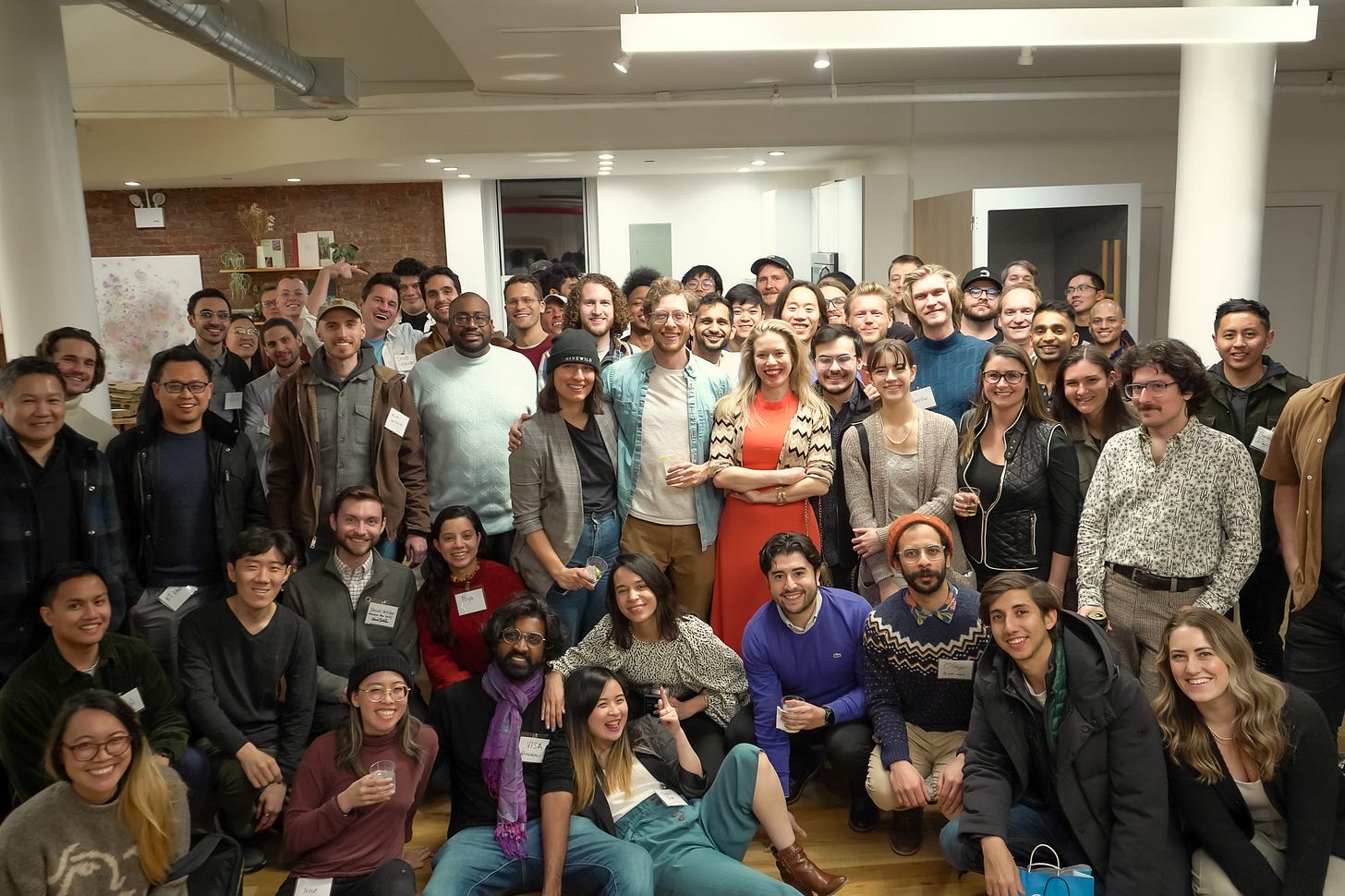INTERVIEW | A Look Back at Thesis Festival
Interintellect founder and CEO Anna Gát on Thesis Festival, co-organized with Every in New York City offline and globally online. Star speakers, community buzz, lessons learned, and more!
What happens when you bring hundreds of minds together to have fruitful discussions in New York City and at online salons? An explosion of warmth and creativity! Our Thesis Festival in February featured a huge volume of speakers on all sorts of topics. There was something for everyone, but more importantly, participants got to converse with the people on the stage both online and offline. We were so excited to put on this event seamlessly, and the inspiration is carrying us forth to planning for the next festival.
Check out this Q&A with Interintellect founder and CEO Anna Gát to learn more about how Thesis was built.
Interintellect members can access all recordings from the conference on our dedicated page! Those include talks by Byrne Hobart, Jason Crawford, Li Jin, Packy McCormick and more. Full list available at the bottom of the page.
How did the Thesis Festival come to be, and why do you think it's important for the world to have a "Thesis"? How was it different from other festivals?
In summer 2022, I was having lunch in Manhattan with [Every CEO] Dan Shipper, who is a good friend, and we discovered that we were both excited about the idea of our respective organizations putting on yearly showcases for our creators.
In Every’s case, they saw a need for their writers to be spotlighted; in our case, we were thinking of the many wonderful salon hosts from all over the world who use our platform and deserve to be further celebrated. We wanted to create an occasion for them to come together and share their knowledge, and for exciting conversations to develop between our communities and audiences on the spot. We knew many friendships and collaborations could form.
The theme of "Thesis" was Dan's idea: he believes that each writer has a driving thesis, a belief or idea underlying their whole work as writers, often hidden between the lines of whatever they happen to be writing about.
Similarly, at Interintellect salons, the hosts are driven by a strong curiosity about their topics and a central standpoint, but these are rarely at the forefront due to the interactive group exploration nature of our salons.
In both cases, bringing forth each creator's driving principle felt like a very special opportunity, something neither writers nor hosts would normally openly spell out.
So we knew we had a good idea, a unique festival that takes attendees "behind the scenes", into how these remarkable individuals' minds work, and what propels them. We decided to build the event around their "theses", as a string of short talks given offline, followed by Q&As, and—to serve the global audience beyond just live streams from New York City—in parallel online salons hosted by a cream of Interintellect hosts and Every writers on the Interintellect platform. We knew this was something we would love to attend ourselves, and that it was going to be like nothing else out there.
How did the Thesis Festival complement Interintellect's vision?
Interintellect is an online cultural center. We are home to the most exciting conversations on the internet, set up and hosted by curious and fearless thinkers from all disciplines, from young up and comers to major established names. We pride ourselves on how friendly, peaceful, and open these conversations are. Our platform provides a civil, accessible, nonpolitical public conversation space online, as well as an accompanying community forum and a worldwide network. We’re here for the minds of the future to find friends and collaborators, make money, and expand their intellectual and professional horizons.
Co-organizing Thesis Festival helped us widen and deepen the scope of the global Interintellect mission: a half-day festival in Manhattan, in a beautiful building courtesy of Higher Ground Education and founder Matt Bateman, and a simultaneous, star-studded lineup of online salons accessible from anywhere. It gave us a chance to showcase some of our best hosts, and have them mingle with Every's best writers as well as an eclectic global audience. We also felt that through the freebies and discounts, Interintellect members could thus get access to even more community benefits. We work hard to continue providing our best to them!
How did you choose the lineup; what made these speakers special?
We knew we wanted a lineup that acted both as a discovery engine for new visionaries, and a chance for our attendees to meet their well-known favorites.
Our headliners included Sahil Lavingia, Visa Veerasamy, Skye Cleary, Anne-Laure Le Cunff, and Eugene Wei live in Manhattan, and on the online side we had Byrne Hobart, Packy McCormick, Khe Hy, Fadeke Adegbuyi, and Li Jin.
We also featured Simone Stolzoff, Henry Oliver, Sonya Mann, Nat Eliason, Liberties managing editor Celeste Marcus, Eric Newcomer, Dr Isabela Granic, Rohit Krishnan, Bryce Roberts, Evan Armstrong - as well as Every founders Dan Shipper and Nathan Baschez. Exceptional Interintellect hosts, creators, and essayists like Crystal Duan, Elaine Wang, Jason Crawford, Jason Shen, Christin Balan, Jon Hillis, and Irene Karthik also participated.
We couldn't have been happier with this cavalcade of talent all coming together with one goal: to discuss their work and ideas with each other and the audience! To our great delight, many of them met for the first time at Thesis. You can check out the full lineup here.
How did you ensure that the online and offline festival portions ran concurrently?
The online festival started a few hours earlier to suit European time zones as well. Otherwise, the two conferences ran in parallel—a lot of work, but totally worth it!
In the Manhattan space, we had a special room set up for managing the online happenings. Some offline participants even hosted online from that room, and then rejoined their friends upstairs. This was very challenging, as you can imagine, but we felt a strong need to make the event accessible to everyone, everywhere.
Our online salons were interspersed with livestream slots from New York so online participants could watch. We planned carefully to make sure the schedules weaved together. All online salons were recorded and shared with the offline hosts and audience after the event. Both events unfolded seamlessly thanks to the tireless setup of the Every and Interintellect teams in New York, and the superb work of the global Interintellect team looking after the online salons.
After the event, we hosted an afterparty courtesy of Contrary Capital and then went out until 3 am to celebrate - there was so much to clink glasses to!
What feedback did you get from festival attendees and what excited you the most about it?
The feedback was extremely positive! People shared their big discoveries with me -- how much they loved listening to Eugene Wei, Matt Bateman, Celeste Marcus, or Linus Lee on the stage, how much they enjoyed Skye and Elaine hosting their breakout rooms on writer existential dread and writer self-compassion respectively. Also highlighted was Visa's charismatic MC-ing, Nathan's talk got special mentions, as well as Sahil and Anne-Laure who are always unique and inspiring. Our dear friend and Thesis online host Jason Shen was also an offline attendee (!) and posted a great recap, plus there were numerous live tweet threads during the event.
Can you give us any information about Thesis 2024?
(Wink-wink.) Stay tuned for more!
List of Available Recordings
Online
Note: Alphabetized (Last Name)
Fadeke Adegbuyi: “Online Platforms are Shaping Our Behaviour (and Lives)”
Jason Crawford: “Great Progress Essays are Solution-Driven Narratives”
Isabela Granic: Workshop: “Creating your ‘Thesis’ Through Collective Play”
Rob Hardy and Sonya Mann: “How We Can Make the Internet Feel More Human and Intellectually Inspiring”
Byrne Hobart: “Why The Social Network was the Most Important Movie of All Time”
Khe Hy and Jason Shen: “What Productivity Can Teach Us About Inner Desires”
Li Jin and Jon Hillis: “On Tech Foundations and the Philosophies of Social Movements”
Irene Karthik and Christin Balan: “Crafting the Personal Essay in an Age of Distractions”
Rohit Krishnan and Packy McCormick: “Writing About Business — While Being Interesting”
Henry Oliver: “Biography and the Art of Living: Reading Better to Live Better”
Bryce Roberts: “We’re Selling Entrepreneurship Short”
Offline
Theory (10 mins talks) Video 1:
Dan Shipper: “Start a Project Not a Startup”
Christin Balan: “What We Can Learn from Screenwriters”
Nathan Baschez: “Narratives Have Network Effects”
Evan Armstrong: “AI Makes Content Go to Zero”
Practice (15 mins talks) Video 1:
Matt Bateman:* “Education Should Give the Power Tools for Agency”
Celeste Marcus: “The Stewardship of Transcendent Experiences for Writers”
Linus Lee: “Creativity in the Age of AI: Redefining and Rethinking Tool Design”
Theory (15 mins talks) Video 2:
Visakan Veerasamy:* “The Clustering of Citizens Who Can Change The World”
Anne-Laure Le Cunff: “Goals, Reimagined: A New Approach to Ambition for Our Liminal Times”
(30 Minutes) Sahil Lavingia: “How Being Religiously Optimistic Shaped Me as a Writer”
Practice (15 mins talks) Video 2:
Simone Stolzoff:* “The Good Enough Job: How Working Less Makes us More Human”
Eric Newcomer: “The Fog: A non-conspiratorial view that much of what’s happening in the world is invisible to the public.”
Nat Eliason: “You and Your Monkey: Why Aren’t We Rich, Fit, Happy Geniuses?”
(30 Minutes) Eugene Wei: “Writing as Technology”
*Note: Regretfully, due to technical difficulties the beginning of these speakers’ talks was not captured.





